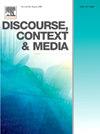Facts, hopes, and fears: Recontextualising experimental drug results for diverse audiences
IF 3.1
2区 文学
Q1 COMMUNICATION
引用次数: 0
Abstract
As the digital environment has become the primary conduit for broad audiences to learn about scientific and technological developments, it is crucial to examine how new knowledge is transformed to be accessible, engaging, and relevant for the public, and to what extent this recontextualised content remains anchored in the original published findings. This case study investigates the online uptake of results from the third clinical trial for an experimental Alzheimer’s drug (Van Dyck et al., 2023; online November 29, 2022), focusing on how knowledge claims (KCs) are modified when communicated to diverse audiences. The analysis is based on a set of digital texts retrieved through an internet query and published within four weeks of the original announcement. Findings reveal selective transfer of KCs, a tendency to amplify desirable claims, and a pronounced shift in the salience of recontextualised content, reflecting audience expectations and media priorities. The study also highlights limited traceability of information intended for broad audiences and considers the implications of these transformations for public understanding of the findings and informed decision-making in health and therapy.
事实、希望和恐惧:为不同受众重新定位实验性药物结果
随着数字环境成为广大受众了解科技发展的主要渠道,研究如何将新知识转化为公众可访问、可参与和相关的知识,以及这些重新背景化的内容在多大程度上仍与原始发表的发现保持联系,这一点至关重要。本案例研究调查了一种实验性阿尔茨海默病药物的第三次临床试验结果的在线吸收(Van Dyck等,2023;重点关注知识声明(KCs)在传播给不同受众时如何被修改。该分析基于一组通过互联网查询检索到的数字文本,这些文本在最初公告发布后四周内发布。研究结果揭示了KCs的选择性转移,放大理想主张的趋势,以及重新语境化内容的显著变化,反映了受众的期望和媒体的优先事项。该研究还强调了面向广大受众的信息的可追溯性有限,并考虑了这些转变对公众理解研究结果和在健康和治疗方面作出知情决策的影响。
本文章由计算机程序翻译,如有差异,请以英文原文为准。
求助全文
约1分钟内获得全文
求助全文

 求助内容:
求助内容: 应助结果提醒方式:
应助结果提醒方式:


